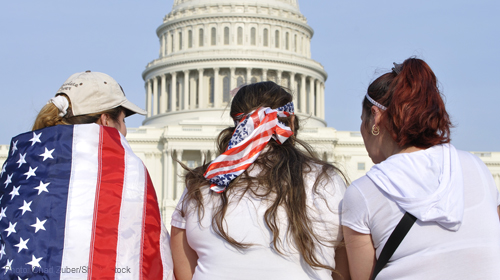
This is my family's American Dream story. I am a divorced, single mother, and an undocumented immigrant. I have resided in the United States for almost 30 years.
We came from Pakistan, a country known for its government abuse, torture, and violence against women. My father, a customs agent, and my mother, an elementary school teacher, knew that the future of their two daughters in Pakistan held limited opportunities. So when I was 3 years old, my parents gave up everything and moved to the U.S. in search of a better life for their children.
We first arrived in California, but I grew up in Florida. While many of my friends went on vacations with their families, shopping trips with their mothers, and sports events with their fathers, I grew up seeing my parents work seven days a week to make ends meet. Yet, my siblings and I understood that these were necessary sacrifices for our new life as immigrants. However, I never once thought of myself as undocumented.
It was not until I was 16 years old and decided to obtain a driver's license that I first encountered my undocumented status. I did not understand why I was unable to obtain a license and live a normal life like my friends. However, once I came to the realization of my true status, or lack thereof, I took action. I enrolled at Broward College when I was 17 through the dual enrollment program – which allows eligible high school students to simultaneously attend college part-time – and continued to work two jobs. I applied for various scholarships and even obtained a Tax Identification Number so that I could work and help support my family. Similarly, my brother earned his bachelor's degree at Broward, and my sister completed a certificate program from the University of Miami, both paying for their tuition themselves. They are now both married to U.S. citizens and are current lawful permanent residents.
However, in early 2012, my life changed immeasurably: I became a mother. My daughter was born with a cleft palate inside of her throat, which affects her hearing. She's had hearing tubes placed with a minor outpatient surgery and is scheduled to undergo another surgery within the next couple of months. Monday through Friday, I would wake up at 4 a.m. to take my daughter on a two-hour bus ride to her day care, commute to work, and then get home at 8 p.m. I constantly worried about my ability to support my daughter and my lack of a stable mode of transportation. Would I be able to find and afford the kind of medical care my daughter needed? If my undocumented status became known, would I be deported and separated from my daughter?
The president's Deferred Action for Childhood Arrivals program (DACA) gave my daughter a second chance at life. I was at the surgeon's office for a pre-operation appointment for my daughter, who was 6 months old at the time, when President Obama made the announcement in 2012 about the new program. I cried in the exam room when I got the call from an attorney I knew. To know that I would finally be able to provide a better life for my daughter was an immense relief. In my home country, doctors do not visit or conduct surgeries unless the full payment has first been made, no matter how deadly the case. I know that I would not have been able to find the kind of medical care that my daughter needs.
When the president announced the Deferred Action for Parental Accountability Program (DAPA) in November 2014, I felt like I would no longer have to be scared of my own shadow. The thought that, even though temporary, I could spend a few years not worrying about losing my daughter or being deported was an exciting moment.
My mother also qualifies for the DAPA program. I currently hold a work permit through DACA, but I too qualify for DAPA because of my daughter. I am grateful that my mother and I can qualify for relief after all the struggles we faced throughout the years.
Learn more about anti-immigrant laws and other civil liberty issues: Sign up for breaking news alerts, follow us on Twitter, and like us on Facebook.

